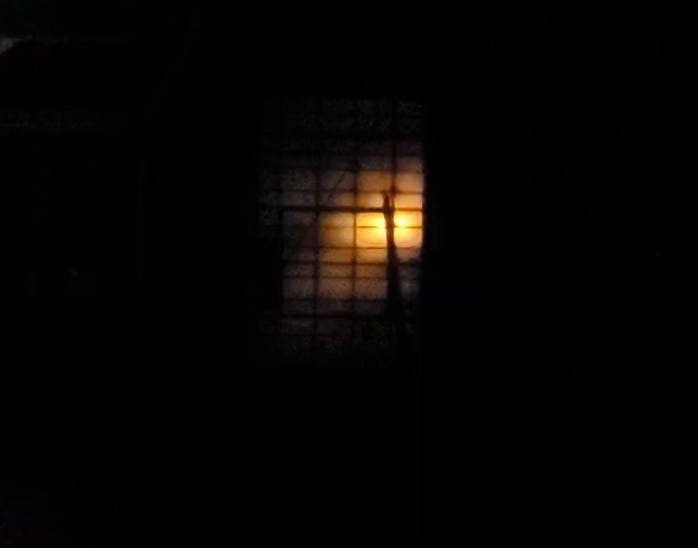My Time With A Temporary Anonymous Cult — ‘Blackheart: Ghosts’ (Review)
A week of emo poetry pays off more than you’d think


Content advisory: the following review contains discussions of psychological and physical trauma, as it pertains to the contents of the production being reviewed.
My parents were not religious people; “kissing movies” were more than allowed from a young age, and no one blinked an eye towards hellfire when I came out as gay. And yet somehow, the band My Chemical Romance became a strange sort of verboten. Perhaps it’s because it was what played in Hot Topic, which once upon a time was the scary store decorated like the gates of Hell, filled with people with purple hair and facial piercings, the aesthetic far more frightening to my suburban parents than any threat of damnation. And yet, hearing them for the first time in my college years, there was something glorious about the raw, almost embarrassing emotionality. These songs wallowed in misery, scream-sung it from the rafters, celebrated and cheered for every dark thought that stained and scarred the hearts of the listener. Even though Blackheart: Ghosts doesn’t quite always know what to do with it, the show does a pretty spectacular job of capturing that same raw energy.
The first thing to note is to take the trigger warnings and initial interview quite seriously. While other shows have warned me of dangers and then underwhelmed, Blackheart fully delivered on promised darkness. No subject matter was too far; while the in-character descriptions of murder and deviance didn’t upset me beyond expectation, player discussion of personal tragedy was often heartbreaking and bleak as could be. Still, I never got the feeling of being emotionally unsafe — the guard rails were apparent. In game and out of game spaces were laudably delineated, and suggestions to find someone for emotional support to debrief about the show with were well advised. I find the care with which the intake interview was conducted to be superb; questions were answered honestly, show content was disclosed with transparency, and the focus was on making sure that the show would both not be a danger to the participant, and the participant wouldn’t be a danger to the performers or audience. For a show that invites as much darkness as Blackheart, these steps felt necessary and appropriate, and it would be good to see more companies make this kind of effort when it comes to immersive horror.
Blackheart: Ghosts itself was more of a mixed bag.
At the show’s start, participants were invited to a Discord server that at first glance appeared to be the recruitment center for a cult. All players adopted names taken from film and literature in order to anonymize them and encourage secret sharing. This cult, The Circle, which we are told has stood at the heart of all Blackheart productions to date, continually invited all participants to share their darkest secrets. Examples were given in the form of nightly poetry from the characters in a Discord voice channel, referred to as church, and specific prompts were given for daily reflections. This is where the real darkness arrives. While it’s easy to say that you believe everyone has secret pains they don’t share with the world, I believe most people don’t really believe it. The nature of secrets means that we can’t really know that anyone feels the same as we do. Seeing a mass of humanity pouring their guts out is not for the faint of heart. Stories of assault, abuse, and despair were nightly fare. Blackheart roots its horror in the fact that the world is a pretty horrifying place. We just need to be given permission to talk about it to realize how much pain surrounds us.

Sadly, the poetry was hit or miss. While some, including a story of a tragic love affair and forced abortion (I told you it got dark) could bring the flintiest audience member to tears, other recitations meandered, and served to direct audience attention more towards the clock. Together, the poems seemed to paint a vague portrait of The Circle’s beginning, and the force that seems to bind the leadership to it. The hunt for narrative clarity added an almost game-like element to it; Blackheart was an ARG in which the main puzzle was to understand what was going on. Sadly, the story still feels like a half finished jigsaw to me. While I see the edges of the plot, and understand the pieces discreetly, the relations of each element are still hard for me to parse. Suffice it to say, The Circle turned out to be as much a prison as a haven for its leaders, and the story tried to balance the themes of the need for catharsis and the acknowledgement of pain, and the exhausting burden it is to carry one’s own history.
Yet all that might be missing the point of Ghosts.
Plot and poetry don’t seem to be the main appeal of a Blackheart production; the Discord room is. Each character, out of their recitations, served to facilitate a chat room at all hours of the day. Not since pouring my teenage angst out on message boards have I been that disclosive to strangers, or had such an opportunity for radical empathy as I did during this experience. With the constant encouragement to wallow and go deeper into pain, I dug up pains I hadn’t thought of in years.
A funny thing happened, though; with everyone being told to be so consistently cruel to themselves, we all got a bit nicer to each other. Blackheart encourages a universal acknowledging of the scars you acquire as a human. While each player is told to rip open those old scars and anonymously confess their traumas, they’re also strongly encouraged (mostly by the modelling of the aggressive, but strangely nurturing non-player characters) to care for one another. The common response to someone revealing a tragedy from their past is “I adore you,” give or take a few choice expletives. These adorations, I’ll admit, struck me as a hollow call and response at first; I suspect for many of the players they started that way. But as we got more comfortable disclosing our real pains, worrying less about writing to impress the group, the adoration was real for a moment. While the stories seemed at first constructed for shock value, the most affecting were the tiny human tragedies. Lost loves sacrificed to time, small lies that had unforeseen consequences, abandonments without the promise of being found again. Once we had all been sharing for a couple days, I found I really did adore these people because they were just like me. And looking at the small tragedies that paved my life in a stark enough light to write them out, I saw I was deserving of love, which meant they also were.
The central tension as to how to evaluate this piece is balancing the quality of the content of the piece vs. the space it created. As a work of group catharsis, Blackheart: Ghosts is spellbinding. As a narrative, it’s only occasionally affecting and often incredibly difficult to follow. Still, I think back to one climactic night. Francis Darcy, our cult leader, reached out to me for a private phone call. All he did was read to me the insults I’d slung at myself the night before, my fears and imperfections magnified under the intensity of the prompt I had been given. Yes, it was hyperbolically edited for my confession that night, but these were still things I told myself often enough that I could get them on paper. “The Circle adores you,” Francis Darcy concluded. And for that night, I believed him. And honestly? That’s enough.
Blackheart: Ghosts has concluded its run. Follow Blackheart Collective’s Instagram for information about future productions.
Discover the latest immersive events, festivals, workshops, and more at our new site EVERYTHING IMMERSIVE, new home of NoPro’s show listings.
NoPro is a labor of love made possible by our generous Patreon backers. Join them today!
In addition to the No Proscenium web site, our podcast, and our newsletters, you can find NoPro on Twitter, Facebook, YouTube, Instagram, in the Facebook community Everything Immersive, and on our Discord.